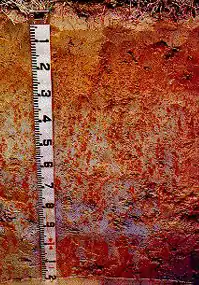Acrisol
An Acrisol is a Reference Soil Group of the World Reference Base for Soil Resources (WRB).[1] It has a clay-rich subsoil and is associated with humid, tropical climates, such as those found in Brazil, and often supports forested areas.[2] In the USDA soil taxonomy,[3] Acrisols correspond to the Humult, Udult and Ustult suborders of the Ultisols and also to Oxisols with a kandic horizon and to some Alfisols.[4] The Acrisols low fertility and toxic amounts of aluminium pose limitations to its agricultural use, favouring in many places its use for silviculture, low intensity pasture and protected areas. Crops that can be successfully cultivated, if climate allows, include tea, rubber tree, oil palm, coffee and sugar cane.[4]
| Acrisol | |
|---|---|
 A Stagnic Acrisol profile from Malaysia | |
| Used in | WRB |
| WRB code | AC |
| Profile | AEBtC |
| Parent material | various |
| Climate | tropical, humid subtropical |
See also
References
- IUSS Working Group WRB (2022). "World Reference Base for Soil Resources, fourth edition" (PDF). International Union of Soil Sciences, Vienna.
- T. R. Yu (1997). Chemistry of Variable Charge Soils. Oxford University Press. p. 36. ISBN 0-19-509745-9.
- Soil Survey Staff (2014). "Keys to Soil Taxonomy, twelfth edition". United States Department of Agriculture, Washington, D.C.
- CHESWORTH, WARD. Encyclopedia of Soil Science. 2001. pp. 22-24
Further reading
- W. Zech, P. Schad, G. Hintermaier-Erhard: Soils of the World. Springer, Berlin 2022, Chapter 7.3.1. ISBN 978-3-540-30460-9
External links
- profile photos (with classification) WRB homepage
- profile photos (with classification) IUSS World of Soils
This article is issued from Wikipedia. The text is licensed under Creative Commons - Attribution - Sharealike. Additional terms may apply for the media files.